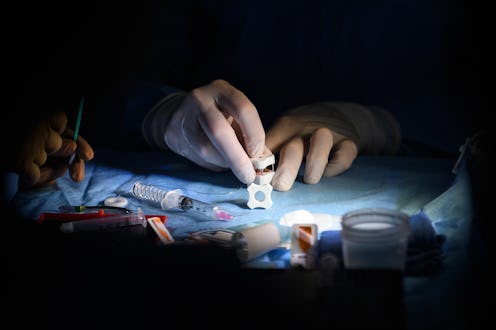Life
Fecal Transplants Might Be The Key To Treating This Serious Infection, A New Study Shows

If you're a Grey's Anatomy super fan, you might remember that episode where Alex treats a patient who has an antibiotic resistant infection with fecal matter. While it sounds gross, fecal transplants are a thing and they actually work, the New York Times reported. Treating bacterial infections with fecal transplants isn't new, but until now it's been a last resort after all other options have failed. Now, a new study published in the New England Journal of Medicine suggests that getting a fecal transplant before trying antibiotics, which many people have developed a resistance to, might be effective in treating C. diff., a potentially fatal bacterial infection that can cause fever, cramps, vomiting, and diarrhea.
Here's the ick factor — the treatment involves getting an enema with a mixture of feces from healthy people. Basically, it's putting healthy poop up your butt to restore a healthy bacterial balance. While antibiotics initially work for some patients, a large number of patients who are given antibiotics have a recurrence of the original infection. This study found that more people recovered fully with a fecal transplant than those who were given antibiotics — but, because the study only looked at a sample of 21 people, a lot more research would need to be done before this becomes the status quo. (The researchers are planning a larger study of 200 people at a later date, the Times reported.)
Because most people think poop is gross, even though everybody poops, other treatments have historically been favored over fecal transplants. "Using feces is a little taboo," Dr. Michael Bretthauer, a gastroenterologist at the University of Oslo and lead author of the study told the Times. "If you are putting someone else’s feces into a patient, there has to be a good reason."
Sometimes, when things freak people out, the benefits can be ignored. According to Dr. Liji Thomas, writing for News Medical, fecal transplants date back to the 1700s, when they were recorded in China. "Despite the volume of empirical evidence, however, it was only in 1978 that the value of [fecal transplants] was widely recognized in treating the refractory intestinal condition called Clostridium difficile resistant diarrhea," Dr. Thomas explained. "In over 95 percent of cases the cure was quick and permanent. Current modifications to the technique include the use of a stool bank, and the use of frozen feces rather than fresh feces."
Intestinal distress is pretty awful, and can significantly impact your quality of life. While the idea of getting a fecal transplant might make you queasy, it's a treatment that has proven effective to provide sustained relief. "The purpose of fecal transplant is to replace good bacteria that has been killed or suppressed, usually by the use of antibiotics, causing bad bacteria, specifically Clostridium difficile, or C. diff., to over populate the colon," The Fecal Transplant Foundation explained on its website. "This infection causes a condition called C. diff. colitis, resulting in often debilitating, sometimes fatal diarrhea."
The foundation added that fecal transplants have also shown promising results in the treatment of some autoimmune diseases like irritable bowel syndrome, Crohn’s disease, ulcerative colitis, and more. What's more, the CBC reported that fecal transplants are being studied as a potential treatment for mental illness, given the possible connection between gut health and brain health. However, despite proven benefits, fecal transplants are not widely accepted as an ideal first-round treatment, the Times reported.
Until larger clinical trials are completed, fecal transplants will continue to be a last resort. Dr. Alexander Khoruts, a gastroenterologist at the University of Minnesota, told the Times that some patients go through an ineffective antibiotic cycle that can last almost a year before they're given an option for fecal transplant. File this under sentences I never thought I'd write: If you've been sidelined by a gastrointestinal illness that won't go away, it may be worth asking your doctor if a fecal transplant could help. #TheMoreYouKnow